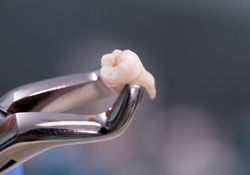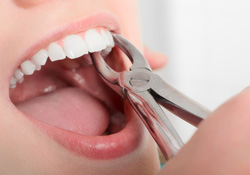


Here at Green Hills Dental Center, we always strive to save our patients’ teeth. Doing so is the best way to ensure their smiles are as healthy and strong as possible. However, sometimes teeth simply can’t be saved (or salvaged) and need tooth extractions in Nashville. Through these removals, our team can protect a patient’s oral health and keep it from getting worse. For more details on how they work, continue reading below or schedule a visit to see us.

Keeping your natural teeth is always best, so our team never takes tooth extraction lightly. The treatment is a last resort – done when no other option exists. We would much rather preserve a tooth with restorative treatments like dental crowns, tooth-colored fillings, etc. That way, you could keep it as the ideal tool for biting, chewing, and smiling.
With all that said, our office only performs tooth extractions in severe cases. We may suggest you get one if you suffer any of the following:

At your consultation visit, we’ll assess your tooth to see how (or if) we should remove it. We’ll then use our findings to confirm whether the extraction (if done) will be simple or complex.
Our team will perform a simple extraction if the affected tooth is visible. For this kind, we’ll start by numbing the treatment site so the procedure goes painlessly. We’ll then use dental forceps to rock your tooth back and forth until it separates from your gums.
If the tooth hasn’t fully erupted, we’ll likely perform a complex extraction. This procedure makes an incision in your gums once we’ve numbed your mouth. Once that’s done, we’ll divide and extract the tooth into sections to reduce bone loss. Treatment will end by sewing the incision closed.
Whether your treatment is simple or complex, we’ll plan how to replace your missing tooth after its removal. This step ensures you won’t suffer the long-term effects of tooth loss.

Adult teeth are normally permanent, so you’ll need time to heal from the extraction process. Your mouth will likely feel achy and sore during this recovery period. Thankfully, you can manage these temporary symptoms by doing the following:
The tips and tricks above should help you heal from your extraction. Once you’ve recovered, you can look into our tooth replacement options. A new prosthetic would restore your smile, improve your bite, and more.

Many patients worry that their tooth extraction will be too expensive, so they want to know what they can expect to pay before scheduling their appointment. However, we can’t provide an estimate until Dr. Kirby can examine your condition to determine what type of extraction is required, which influences the final amount due.
Continue reading to learn more about the different considerations that can influence your invoice, and feel free to contact us with additional questions.

You might not pay the same dollar value for this procedure as someone else because the cost depends on your unique situation. Several different factors can affect the total price of having your tooth removed, including:

Most dental insurance policies cover about 50% of major procedures like tooth extractions once your deductible has been met. Every plan is different, though, and there’s no guarantee, so you may need to check your information to verify whether it’s included. Please let us know if you’re struggling to find the information or would like help with claims, applications, or other paperwork. Our friendly office staff would be happy to assist you!

Although we are in-network with many of the most common insurance providers, we know that not all patients carry a policy. However, we don’t want your budget to hold you back from undergoing the procedures necessary to protect and preserve your smile. If you’re concerned that you can’t afford to have a tooth removed, you might benefit from one of the following options:
One of your top concerns regarding the tooth extraction process is likely to be whether the process will be painful. Rest assured that our team will always take whatever steps are needed to keep you as comfortable as possible. Before the extraction begins, a local anesthetic will be applied to your mouth. This keeps the area numb, meaning you won’t experience pain during the procedure (although you might feel a bit of pressure).
It’s normal to experience soreness once the numbness wears off. We can give you aftercare tips that can help minimize your discomfort while your mouth is healing. The soreness should fade on its own as time passes. Please let us know immediately if the discomfort seems to be getting worse or if you’re noticing any warning signs (such as a fever) that might indicate that an infection has occurred.
You do have the option of simply not replacing an extracted tooth, but this is generally not the best choice for your smile. Each tooth plays an important role in your mouth; losing even just one could affect your ability to speak clearly or chew your food properly. On top of that, when there’s a gap in your smile, any remaining teeth will start to drift, which can ultimately result in serious alignment issues.
We want our patients to avoid the worst of the problems associated with tooth loss. Thus, when our team recommends a tooth extraction, we will make sure that you’re aware of your options for replacing the tooth or teeth in question, and we’ll help you pick the treatment that’s right for your unique smile.
First, you should let your dentist know about any questions or concerns that are on your mind regarding the tooth extraction process. That way, you can make sure that you’re as prepared as possible for the procedure. On top of that, you should follow any pre-treatment instructions that you’re given; this might include only drinking water the morning of your appointment or picking up a prescription medication for managing the discomfort afterward.
Sometimes having your remaining teeth extracted is a prerequisite to getting personalized dentures to recomplete your smile. Once your teeth have been removed, you can normally expect to receive your new dentures in about six to eight weeks. This is partly due to the fact that the mouth needs time to heal properly before impressions can be taken; that way, you can rest assured that your new dentures will fit properly.
Don’t hesitate to ask us any timeline-related questions during your initial consultation. We want you to have an accurate idea of what to expect when it comes to your tooth extraction and any associated treatments.